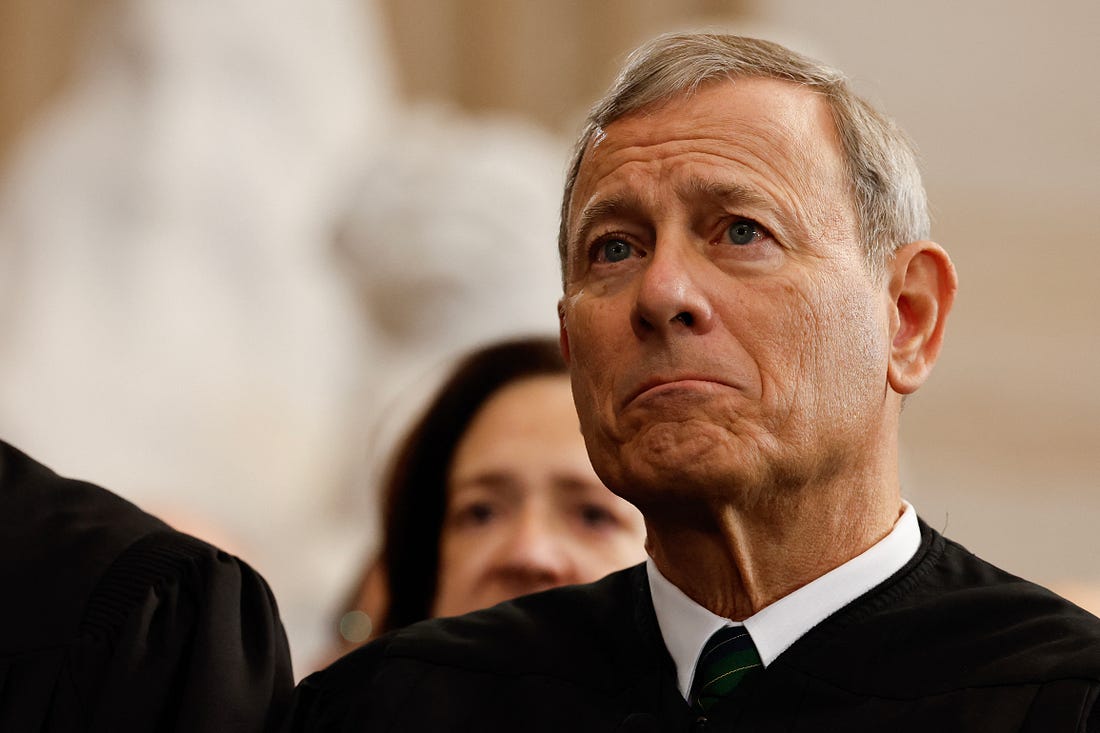|
🗣️ Paid subscribers make Public Notice possible. If you appreciate our fiercely independent coverage of American politics, please sign up and support us. 👇
American history has no shortage of legendarily bad chief justices and disgraceful decisions. But Chief Justice John Roberts has overseen the wholesale corruption and capture of the Supreme Court, and history should look back on his tenure with revulsion.
This isn’t about whether there are individual cases from the past that are worse than any individual Roberts-era decision. It’s that compared to previous chief justices, the entire arch of the Robert Court has been about enshrining discrimination into law and protecting the powerful at the expense of the powerless.
The Taney Court
When people talk about the worst Supreme Court era, they’re often talking about Chief Justice Roger Taney, who headed the Court from 1836 to 1864. Taney wrote the majority opinion in Dred Scott v. Sandford, the 1857 case widely considered to be the Supreme Court’s most shameful decision.
Taney’s brazenly racist opinion said that a Black person whose ancestors were brought to the United States and sold into slavery could never be an American citizen. The majority also held that enslaved people were property, and because the Fifth Amendment forbids deprivation of property without due process, Congress could not ban slavery in the federal territories.
If the Taney Court had only given us Dred Scott, that alone would be enough to stain Taney’s tenure forever. But that decision built upon several previous Taney-era cases that laid the groundwork for the comprehensive dehumanization of Black people found in Dred Scott.
Fifteen years previously, the Taney Court had decided Prigg v. Pennsylvania. The majority overturned a Pennsylvania law prohibiting the extradition of Black people to other states to enslave them. The Court held the law was unconstitutional under Article IV, Section 2, the Fugitive Slave Clause. Only Congress, the Court said, could pass laws about the return of fugitives.
In 1847’s Jones v. VanZandt, John VanZandt, an abolitionist, argued that slavery was unconstitutional. Nope, said the Taney Court. Slavery was a “political question, settled by each state for itself,” and one of the “sacred compromises” of the Constitution was that it protected the institution of slavery so that Southern states would remain in the Union. Taney’s majority opinion four years later in Strader v. Graham said the Court had no jurisdiction to review a Kentucky court’s determination that time spent in Ohio, a free state, did not change the status of the enslaved men because that court’s ruling was based entirely on Kentucky state law.
Taney also mused that when new states formed, they had the right “to be admitted into the Union upon an equal footing with the old states.” The “old states” he’s talking about here are the original 13 states, which were able to choose to have slavery. Gotta give every new state a chance to become a slave state, for freedom.
A note from Aaron: Enjoying this article from Lisa? Then please sign up to support our work 📈 Paid subscribers keep PN free for everyone 📈
Taney died in October 1864, about six months before the end of the Civil War. Between 1865 and 1870, the Reconstruction Amendments were ratified. The Thirteenth Amendment abolished slavery. The Fourteenth Amendment extended citizenship to formerly enslaved persons and their descendants and established the right to equal protection under the law. The Fifteenth Amendment guaranteed the right to vote, regardless of race or previous enslavement.
These amendments undid much of the Taney Court’s work of justifying and propping up slavery. Indeed, the Fourteenth Amendment’s citizenship guarantee overturned Dred Scott. But by 1877, the Reconstruction era had ended, and with it much of the efforts to protect the rights of Black people.
The Fuller Court
Chief Justice Melville Fuller, who helmed the Court from 1888 to 1910, was no slouch at ensuring the Court supplemented its commitment to racism with an equally fervent commitment to economic exploitation.
The Fuller Court is responsible for the spiritual successor to Dred Scott,

